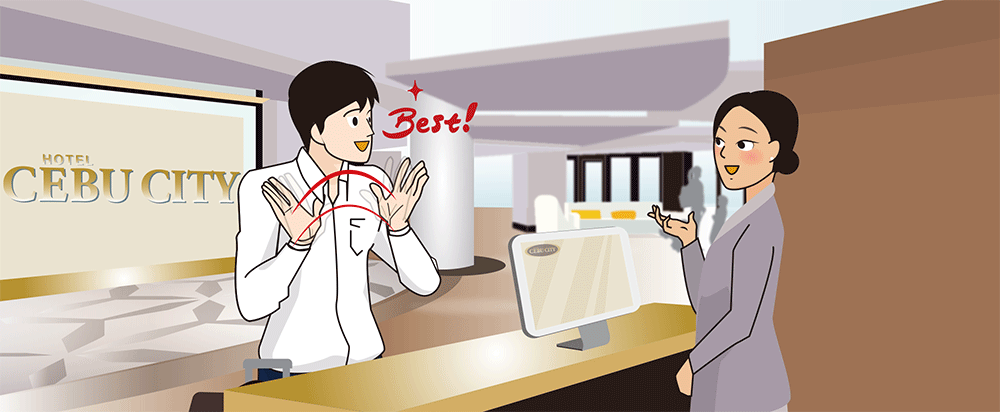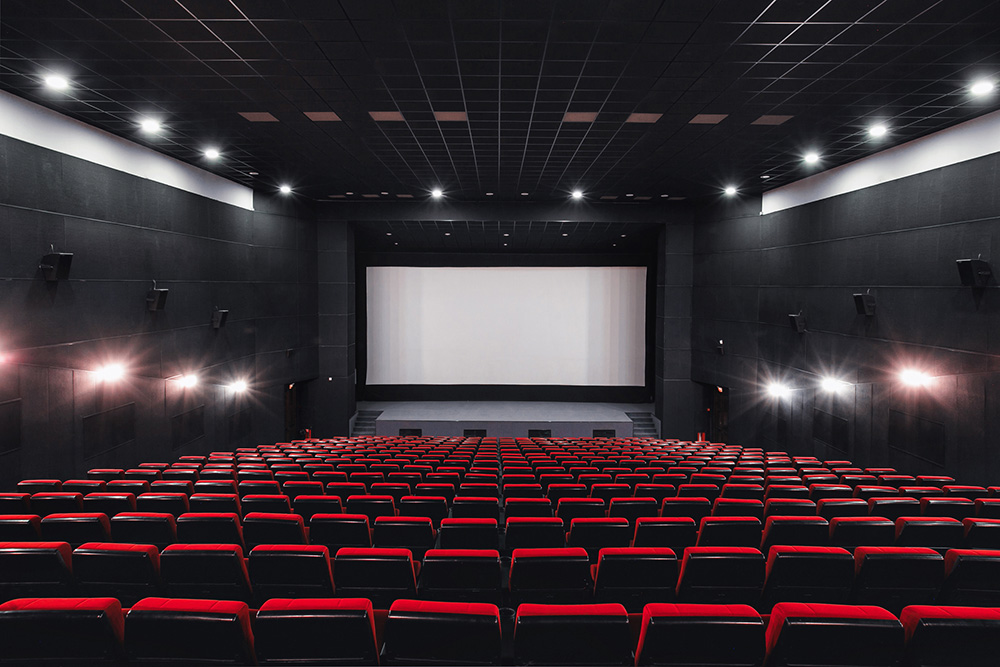Today's Point
今日のポイント最上級は、形容詞・副詞の原級の語尾にestを付け、通常、theを付けます。
語尾が〈子音字+y〉で終わるものは、yをiにしてestを付けます。例:happy→happiest
語尾がeで終わるものは、stを付けます。例:large→largest
語尾が〈短母音+子音字〉で終わるものは、子音字を重ねてestを付けます。hot→hottest
長い語は、前にmostを置きます。
〈原級→比較級→最上級〉の順で、以下のように不規則に変化する語があります。
例:good→better→best 、well→better→best、bad→worse→worst
many/much→more→most、little→less→least
キーフレーズは、the best hotel in Cebu、その他「今日のストーリー」でもthe most expensive hotel in Cebuとなっていますね。

今日はホテルをチェックアウトします。
ホテルセブシティをとても気に入ったケンが、「こちらはセブで最高のホテルですね!」と言っています。
クレジットカードで支払いをして、明細書の金額をみたケンは、びっくり!
つい、「セブで最も高額なホテルでもあるんでしょうね。」と言ってしまいました。

Story of the Day
今日のストーリーRepeat after your teacher.
先生の後に続けて言ってみましょう。
| Ken : I want to check out now. | ケン : チェックアウトお願いします。 |
|---|---|
| Receptionist : Of course, sir. | フロント : 承知いたしました。 |
| Receptionist : Did you enjoy your stay with us? | フロント : 当ホテルでのご滞在、楽しんでいただけましたでしょうか? |
| Ken : Yes, very much. | ケン : ええ、とても。 |
| Ken : This is the best hotel in Cebu! | ケン : こちらはセブで最高のホテルですね! |
| Receptionist : I’m very glad to hear that. | フロント : そう言っていただけて大変うれしいです。 |
| Receptionist : Did you have anything from the minibar? | フロント : ミニバーはお使いになりましたか? |
| Ken : Oh, yes. Just a bottle of beer. | ケン : はい、ビール1本だけですが。 |
| Receptionist : Okay. | フロント : わかりました。 |
| Receptionist : Would you like to pay by cash or credit card? | フロント : お支払いは現金でしょうか、それともクレジットカードになさいますか? |
| Ken : Do you accept this card? | ケン : このカードは使えますか? |
| Receptionist : Yes, we do. | フロント : はい、大丈夫です。 |
| Receptionist : Here is your bill, sir. | フロント : こちらが明細書になります。 |
| Ken : Wow... This must also be the most expensive hotel in Cebu. | ケン : わあ!セブで最も高額なホテルでもあるんでしょうね。 |
Key Phrase
キーフレーズRepeat after your teacher.
先生の後に続けて言ってみましょう。
This is the best hotel in Cebu.
Vocabulary / Expressions
ボキャブラリーと表現Repeat after your teacher.
先生の後に続けて言ってみましょう。
| accept(動詞) | 受け入れる |
|---|---|
| bill(名詞) | 明細書、請求書、勘定書 |
| expensive(形容詞) | 値段が高い |
Exercise
エクササイズ ARead the conversation aloud with your teacher. Fill in the blanks with a, b and c.
After that, fill in the blanks with your own words and practice the conversation with your teacher.
下記の会話の空欄に、a, b, cそれぞれの言葉を入れて、先生と一緒に音読してみましょう。
そのあと、空欄に入る言葉を自分で考えて、先生と会話をしてみましょう。

| Receptionist : Did you enjoy your stay with us? | フロント : 当ホテルへのご滞在、楽しんでいただけましたでしょうか? |
|---|---|
| Ken : Yes, very much. | ケン : ええ、とても。 |
| Ken : This is the best hotel in ________ (a. the world b. this town c. this area)! | ケン : こちらは(a. 世界 b. この町 c. この地域)で最高のホテルですね! |
| Receptionist : I’m very glad to hear that. | フロント : そう言っていただけて大変うれしいです。 |
| Receptionist : Did you ________ (a. take b. drink c. eat) anything from the minibar? | フロント : ミニバーから(a. お取りになった b. お飲みになった c. お食べになった)ものはございますか? |
| Ken : Oh, yes. Just a bottle of beer. | ケン : はい、ビール1本だけですが。 |
Exercise
エクササイズ B (Vocabulary Building)Choose the correct word from the box.
空欄に当てはまる言葉を選んで文章を完成させてください。
- accept
- bill
- expensive
- This shirt is too ________ for me.
- We ________ cash and credit cards.
- Can we have our ________?
Exercise
エクササイズ CSituation : Talk about your favorite movie to a friend.
ロールプレイ : 好きな映画について友だちに話してください。


Extra Exercise
Try the Extra Exercises. As with Exercise A, become familiar with some of these more advanced phrases.
エクストラ・エクササイズに挑戦してみましょう。
エクササイズAと同じ要領で、より高度なフレーズを練習してみましょう。
| Jose: Congratulations, James! Your proposal won the contest. |
|---|
| James: Thanks! I thought yours was very good, too. |
| Jose: Yeah, but yours was the most (a. outstanding b. impressive c. persuasive) of all the proposals. |
| James: Thanks! |
| Jose: We should celebrate. |
| James: Let’s go to the craft beer brewery down the road. They have the (a. biggest selection of craft beer b. best food c. finest beers) in Cebu! |
| Jose: Great idea! Do you want to join us, Ken? |
| Ken: Did anybody see my proposal?! |

- in Cebuのように、inの後には、比較の条件となる「場所」や「範囲」を表す語を用います。一方、of all proposalsのようにofの後には比較の条件となる「(複数の)人・もの」を表す語がきます。
- down the roadは「この道の先の方に」という意味ですが、downがあるからといって坂道を下っていくのではありません。このdownは、その場所から「離れて」「遠ざかって」という意味なので注意しましょう。
- outstandingは「傑出した」、impressiveは「印象的な」、persuasiveは「説得力のある」、craft beerは「クラフトビール=地ビール」、breweryは「(ビールなどの)醸造所」。